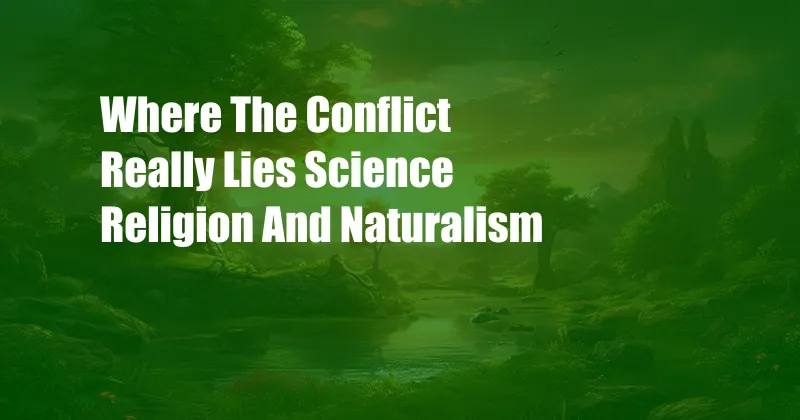
Where Science, Religion, and Naturalism Intersect: Unraveling the Conflicts
In the realm of human inquiry, science, religion, and naturalism often find themselves entangled in a web of conflict and debate. From the origins of the universe to the nature of consciousness, these three perspectives grapple with fundamental questions that have shaped our understanding of the world.
The conflict between science and religion has been particularly prevalent throughout history, with each side claiming to offer exclusive truths. Science, rooted in empirical observation and rational logic, asserts that the natural world can be explained through scientific laws and theories. Religion, on the other hand, often relies on faith and revelation as sources of knowledge, asserting that there are certain truths that are beyond the reach of science.
Naturalism: Challenging the Supernatural
Naturalism, a philosophical approach that rejects the existence of anything supernatural, has emerged as a third party in this conflict. Naturalists argue that everything in the universe, including human beings and our consciousness, can be explained through natural causes and processes. They dismiss religious beliefs as mere superstition or attempts to fill gaps in our scientific understanding.
The conflict between science, religion, and naturalism stems from their different fundamental assumptions about the nature of reality. Science assumes that the universe is governed by natural laws and that all phenomena can be explained through scientific inquiry. Religion assumes that there is a higher power or supernatural force that influences the world. Naturalism rejects the existence of any supernatural forces, asserting that everything in the universe is natural and subject to scientific laws.
In recent years, the conflict between science and religion has become less pronounced, with many scientists and theologians finding common ground in a shared search for understanding. However, the conflict between naturalism and religion remains a significant intellectual debate.
Understanding the Claims of Each Perspective
To gain a better understanding of this complex conflict, it is essential to examine the claims of each perspective in detail.
Science claims that the natural world is governed by laws that can be discovered through observation and experimentation. Scientists seek to test hypotheses and theories through empirical evidence, and they reject any claims that cannot be supported by scientific data.
Religion claims that there is a higher power or supernatural force that influences the world. Religious beliefs are often based on faith and revelation, and they may include beliefs about the creation of the universe, the nature of the human soul, and the existence of an afterlife.
Naturalism claims that everything in the universe, including human beings and our consciousness, can be explained through natural causes and processes. Naturalists reject the existence of any supernatural forces, asserting that everything in the universe is natural and subject to scientific laws.
Tips for Engaging in Constructive Dialogue
When engaging in discussions about science, religion, and naturalism, it is essential to approach these topics with an open mind and a willingness to learn from others. Here are a few tips for fostering constructive dialogue:
- Respect the beliefs of others: Even if you do not agree with someone’s beliefs, it is important to respect their right to hold those beliefs.
- Avoid making generalizations: Do not assume that all scientists or all religious people hold the same views. There is a wide range of beliefs within both groups.
- Listen to understand: When someone is sharing their views, try to listen with an open mind and seek to understand their perspective.
- Be willing to change your mind: It is okay to change your mind if new evidence or arguments are presented. Be willing to adjust your views in light of new information.
Frequently Asked Questions
Q: Is it possible to believe in both science and religion?
A: Yes, it is possible to believe in science and religion. Many people believe that science and religion can coexist and complement each other. This is known as theistic evolution.
Q: What is the difference between naturalism and atheism?
A: Naturalism is the philosophical view that everything in the universe, including human beings and our consciousness, can be explained through natural causes and processes. Atheism is the belief that there is no god or gods.
Q: Is naturalism a religion?
A: No, naturalism is not a religion. Religion typically involves belief in a supernatural being or beings, while naturalism does not.
Conclusion
The conflict between science, religion, and naturalism is a complex and ongoing debate that has shaped human thought for centuries. While these three perspectives often find themselves at odds, it is important to remember that they all share a common goal: the pursuit of knowledge and understanding. By engaging in constructive dialogue and respecting the beliefs of others, we can strive to find common ground and advance our understanding of the world we live in.
Are you interested in learning more about the topic of science, religion, and naturalism? Let’s start a discussion in the comments section below.